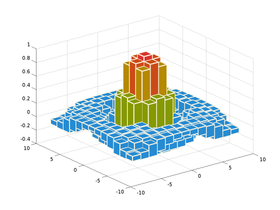Interval package
The GNU Octave interval package for real-valued interval arithmetic.
Distribution
- Latest version at Octave Forge
pkg install -forge interval- function reference
- package documentation (user manual)
- MacPorts for Mac OS X
- FreshPorts for FreeBSD
Development status
- Completeness
- All required functions from IEEE Std 1788-2015, IEEE standard for interval arithmetic, are implemented. The standard was approved on June 11, 2015. It will remain active for ten years.
- Planned: more solvers
fsolve,- and possibly
roots - Algorithms can be migrated from the C-XSC Toolbox (C++ code) from [1] (see nlinsys.cpp, and cpzero.cpp respectively).
- Planned: Improvement of the user documentation
- Explain more interval arithmetic concepts with examples from the package
- Planned: Interval version of
interp1
- Quality
- Includes tests for all functions, many tests for basic functions
- No known bugs. The package is quite new and still has a small user base, so there might be hidden bugs. Also some advanced functions need more testing.
- Portability
- Runs in GNU Octave 3.8.2 and 4.0.0
- Known to run under GNU/Linux, Microsoft Windows, Mac OS X and FreeBSD
Compatibility
The interval package's main goal is to be compliant with IEEE Std 1788-2015, so it is compatible with other standard-conforming implementations (on the set of operations described by the standard document).
Octave Forge simp package
In 2008/2009 there was a Single Interval Mathematics Package (SIMP) for Octave, which has eventually become unmaintained at Octave Forge.
The simp package contains a few basic interval arithmetic operations on scalar or vector intervals. It does not consider inaccurate built-in arithmetic functions, round-off, conversion and representational errors. As a result its syntax is very easy, but the arithmetic fails to produce guaranteed enclosures.
It is recommended to use the interval package as a replacement for simp. However, function names and interval constructors are not compatible between the packages.
INTLAB
This interval package is not meant to be a replacement for INTLAB and any compatibility with it is pure coincidence. Since both are compatible with GNU Octave, they happen to agree on many function names and programs written for INTLAB may possibly run with this interval package as well. Some fundamental differences that I am currently aware of:
- INTLAB is non-free software, it grants none of the four essential freedoms of free software
- INTLAB is not conforming to IEEE Std 1788-2015 and the parsing of intervals from strings uses a different format—especially for the uncertain form
- INTLAB supports intervals with complex numbers and sparse interval matrices, but no empty intervals
- INTLAB uses inferior accuracy for most arithmetic operations, because it focuses on speed
- Basic operations can be found in both packages, but the availability of special functions depends
| Code: In GNU Octave the interval package can also be run alongside INTLAB. |
# INTLAB intervals
A1 = infsup (2, 3);
B1 = hull (-4, A1);
C1 = midrad (0, 2);
# Interval package intervals
pkg load interval
A2 = infsup (2, 3);
B2 = hull (-4, A2);
C2 = midrad (0, 2);
pkg unload interval
# Computation with INTLAB
A1 + B1 * C1
# Computation without INTLAB
A2 + B2 * C2
|
Similar software
For C++ there is an open source interval library libieeep1788 by Marco Nehmeier (member of IEEE P1788). It aims to be standard compliant with IEEE Std 1788-2015 and is designed in a modular way, supporting several interval data types and different flavors of interval arithmetic [2]. The GNU Octave interval package shares several unit tests with libieeep1788.
For C++, Pascal and Fortran there is a free interval library XSC. It is not compliant with IEEE Std 1788-2015. Some parts of the GNU Octave interval package have been derived from C-XSC.
For MATLAB there is a proprietary interval arithmetic toolbox INTLAB by Siegfried Rump. It had been free of charge for academic use in the past, but no longer is. Its origin dates back to 1999, so it is well tested and comprises a lot of functionality, especially for vector / matrix operations. INTLAB is compatible with GNU Octave since Version 9 [3].
